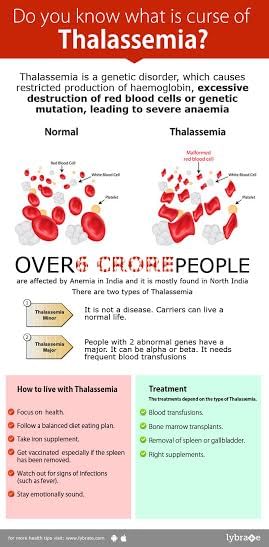Get the App
For Doctors
Login/Sign-up
Last Updated: Jan 10, 2023
BookMark
Report
Read Dr. Jatin Soni's Health Tip on The Occasion of World Thalassemia Day
Did you know that Thalassemia is a common blood disorder in India, that?s passed through families (just the way it was passed to Abhishek Bachchan because megastar Amitabh Bachchan is a carrier). It is characterized by excessive destruction of red blood cells or genetic mutation, leading to anaemia. Today is World Thalassemia Day, lets understand about the disease.
Thalassemia can be classified into alpha and beta, depending on the globin genes that are affected.
1. Thalassemia Minor - Usually doesn?t have any symptoms, except for minor anaemia.
2. Beta Thalassemia - Has two serious types.
2.A) Thalassemia Major: This type usually happens before a child?s second birthday and requires regular blood transfusions. The condition is life-threatening. Symptoms include anaemia, fussiness, frequent infections, paleness of the skin, poor appetite, enlarged organs and jaundice.
2.B) Thalassemia Intermedia: It is a less severe form and doesn?t require blood transfusions. The symptoms include anemia, jaundice, extremely large spleen and malnourishment.
3. Alpha Thalassemia: Only in rare cases this severe form of Thalassemia may be present. Known as Hydrops Fetalis, this condition usually occurs before birth and children are either stillborn or die soon afterwards.
How to live with Thalassemia:
Take steps to be as healthy as possible. Follow a balanced diet eating plan as per the recommendation of your doctor. Take iron supplement only if prescribed. It is recommended that patients get themselves vaccinated whenever needed, especially if their spleen has been removed. Meanwhile, always be on a lookout for the signs of infections (such as fever) and lower your risk of infections. Thalassemia can spark fear, anxiety, depression and stress. That?s why, doctors recommend that patients receive adequate emotional support.
Treatment:
The treatments depend on the kind of Thalassemia an individual has. Usually, treatment procedures include blood transfusions, bone marrow transplants, removal of spleen or gallbladder specific medications and supplements.
If you have any more questions on this topic, click on consult privately to ask me.
From Lybrate: If you found this tip useful, please thank the doctor by clicking on the heart icon below. Also, spread good health by sharing this tip with your loved ones over WhatsApp, Facebook and other media.
Thalassemia can be classified into alpha and beta, depending on the globin genes that are affected.
1. Thalassemia Minor - Usually doesn?t have any symptoms, except for minor anaemia.
2. Beta Thalassemia - Has two serious types.
2.A) Thalassemia Major: This type usually happens before a child?s second birthday and requires regular blood transfusions. The condition is life-threatening. Symptoms include anaemia, fussiness, frequent infections, paleness of the skin, poor appetite, enlarged organs and jaundice.
2.B) Thalassemia Intermedia: It is a less severe form and doesn?t require blood transfusions. The symptoms include anemia, jaundice, extremely large spleen and malnourishment.
3. Alpha Thalassemia: Only in rare cases this severe form of Thalassemia may be present. Known as Hydrops Fetalis, this condition usually occurs before birth and children are either stillborn or die soon afterwards.
How to live with Thalassemia:
Take steps to be as healthy as possible. Follow a balanced diet eating plan as per the recommendation of your doctor. Take iron supplement only if prescribed. It is recommended that patients get themselves vaccinated whenever needed, especially if their spleen has been removed. Meanwhile, always be on a lookout for the signs of infections (such as fever) and lower your risk of infections. Thalassemia can spark fear, anxiety, depression and stress. That?s why, doctors recommend that patients receive adequate emotional support.
Treatment:
The treatments depend on the kind of Thalassemia an individual has. Usually, treatment procedures include blood transfusions, bone marrow transplants, removal of spleen or gallbladder specific medications and supplements.
If you have any more questions on this topic, click on consult privately to ask me.
From Lybrate: If you found this tip useful, please thank the doctor by clicking on the heart icon below. Also, spread good health by sharing this tip with your loved ones over WhatsApp, Facebook and other media.



+1.svg)
